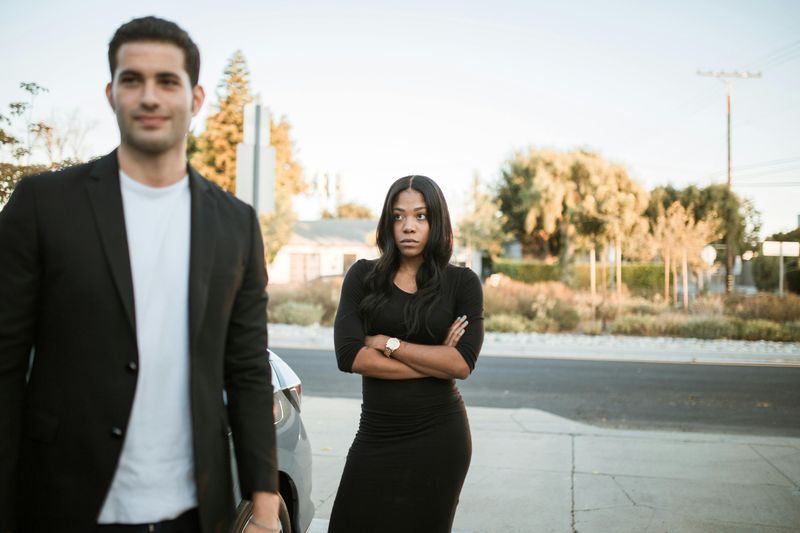Ever find yourself falling for someone who’s about as emotionally accessible as a bank vault on Sunday? You’re not alone. Many of us get stuck in a loop of pursuing partners who can’t (or won’t) connect deeply. This frustrating cycle isn’t random – it’s often tied to patterns we don’t even realise we’re following.
1. The Familiar Feels Safe

Growing up with emotionally distant parents often leaves an unexpected mark. That chilly emotional climate becomes your normal, like wearing a jumper in summer because you’ve never known different.
When you meet someone warm and available, it might actually feel wrong – too intense or smothering. Your brain sends warning signals: ‘This isn’t what love looks like!’
Meanwhile, that aloof person who keeps you at arm’s length? They feel like home, triggering the same emotional responses you’ve been practicing since childhood.
2. Fear of Genuine Intimacy

Real intimacy requires vulnerability – showing your authentic self, warts and all. Terrifying, isn’t it? When someone gets too close, panic sets in.
Choosing partners who keep emotional distance creates a perfect safety buffer. You can say you want closeness while secretly relieved it’s not happening. It’s like claiming you want to swim while only dating people who avoid water.
This unconscious strategy protects you from rejection but also prevents the very connection you claim to want.
3. The Thrill of the Chase

There’s something intoxicating about pursuing someone just out of reach. Your brain releases dopamine – the same chemical triggered by gambling and chocolate – creating a genuine high when they finally text back.
Consistent, reliable affection simply doesn’t deliver the same rush. It’s like comparing a rollercoaster to a merry-go-round – one’s thrilling precisely because it feels dangerous.
We become addicted to the emotional peaks and valleys, mistaking drama for passion and instability for excitement.
4. Low Self-Worth Whisperer

Secretly believing you don’t deserve complete love creates a self-fulfilling prophecy. You’re drawn to people who confirm your worst fears about yourself.
When someone treats you as optional, a little voice whispers, ‘See? This is what you’re worth.’ Their emotional unavailability feels deserved rather than problematic.
Full, unconditional love feels suspicious because it contradicts your internal narrative. You might even sabotage healthy relationships to return to the familiar comfort of feeling not-quite-enough.
5. Mistaking Potential for Reality

Those tiny glimpses of connection become everything. Remember that one meaningful conversation at 2 am? Or how they opened up after three glasses of wine?
You’re not dating the actual person but the idealized version you’ve constructed from these rare moments. It’s like judging a restaurant by its best dish while ignoring that everything else gives you indigestion.
This potential-based relationship keeps you hooked on possibilities rather than accepting the consistently unavailable person standing before you.
6. The Fixer’s Syndrome

Nothing feels more heroic than being the special someone who finally breaks through those emotional walls! Your partner’s unavailability becomes a challenge to overcome rather than a fundamental compatibility issue.
This saviour complex offers a convenient distraction from your own emotional work. While focused on fixing them, you needn’t address your own vulnerabilities.
Plus, their emotional growth becomes your responsibility; creating an unhealthy dynamic where your worth depends on their transformation.
7. Confusing Intensity with Intimacy

Hot-and-cold relationships create emotional intensity that’s easily mistaken for deep connection. When someone’s attention comes and goes unpredictably, each reconnection feels profoundly meaningful.
Your nervous system gets hijacked by the dramatic swings between anxiety and relief. That butterflies-in-stomach feeling isn’t necessarily love; it might just be stress hormones having a party.
Meanwhile, consistent relationships might seem boring by comparison, lacking the dramatic reconciliations that feel like movie moments but actually signal dysfunction.
8. The Control Illusion

Emotionally unavailable partners offer a strange form of relationship control. When someone doesn’t fully show up, you maintain the upper hand in vulnerability; never quite revealing your complete self either.
This emotional distance creates a false sense of safety. You can’t be truly rejected if you’re never fully present yourself, can you?
It’s a defensive strategy that feels protective but actually ensures neither person experiences genuine connection, like two people having a conversation through closed doors.
9. Childhood Wound Reenactment

Our subconscious loves attempting to rewrite painful childhood stories. If you were abandoned, neglected, or had to earn love as a child, you might unconsciously seek similar dynamics as an adult.
The logic? If you can make someone emotionally unavailable finally love you properly, you’ll heal that original wound. It’s like returning to the scene of an emotional crime hoping for a different outcome.
Unfortunately, these recreations typically reinforce rather than resolve the original pain, keeping you trapped in a loop of familiar hurt.
10. Misreading Red Flags as Green

Emotional unavailability often gets romanticized in our culture. We’re taught that the mysterious, aloof character just needs the right person to open up to; and naturally, that’s you!
Mixed signals become exciting rather than concerning. Their reluctance to commit transforms into ‘taking things slowly.’ Their emotional distance becomes ‘independence.’
This misinterpretation of warning signs as positive traits keeps you invested in fundamentally incompatible relationships, like mistaking a stop sign for an invitation to proceed.
11. The Comfortable Discomfort Zone

Sometimes the devil you know feels safer than the angel you don’t. After a history of emotional unavailability, healthy relationships can feel alarmingly unfamiliar; even boring.
Where’s the drama? The angst? The obsessive checking of your phone? Without these familiar discomforts, you might feel oddly adrift, like missing the weight after taking off a heavy backpack.
This emotional comfort zone keeps you returning to unhealthy patterns not because they’re good, but because they’re known territories on your relationship map.